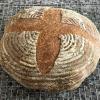
Infinity Bread (ft. Emmer)
This is as much for anyone looking for a way to bake with emmer flour as for any other reason, but that should be sufficient. Emmer is a nice flour (mine comes from Barton Springs, but it is available generally).
For those who read my post in the Community Bake thread, you might recall that I mentioned wanting to make a few changes. This bake incorporated a soaker, which softened the rye chops especially. In addition, the soaker added some needed hydration to the dough. Lastly, I did only two sets of stretch-and-folds. All of these changes were for the better, and I see no need to make any more for the next few bakes (my opinion could always change, of course).
Here is a summary in case you are looking for a recipe involving emmer.
Levain
Starter 40 g
Bread Flour 100 g
Whole Wheat Flour 100 g
Water 250 g
Soaker
Rye Chops 50 g
Oats 30 g
Sunflower Seeds 20 g
Water (boiling) 100 g
Final Dough
Bread Flour 234 g
Whole Wheat Flour 233 g
Emmer Flour 333 g
Soaker all
Water 470 g
Levain all
Salt 18 g
I prepared the Levain as well as the Soaker the night before and let them sit at room temperature. When the Levain was properly bubbly, I combined the Final Dough flours, the Soaker, and the water until they were rough and shaggy. You might think that you need to add water to make the components into a single mass, but resist that urge. The Soaker will provide the moisture.
Then I let the combo sit for a half hour before adding the Levain and salt. For this step I employed Forkish's pincher method of mixing, and you will definitely need to work the dough to get the Levain thoroughly distributed in the Final Dough. After mixing (I included eighty French Folds), the dough temperature was only 72F, and the kitchen was 70F. I anticipated a little longer bulk fermentation.
After sixty minutes I did the first stretch-and-fold and then another an hour after that. Thereafter the dough sat until it was ready for pre-shaping. For this bake the total bulk fermentation was four hours and eighteen minutes. The dough went onto the counter and was divided into two portions, both of which were pre-shaped into rounds. After a twenty minute bench rest, one portion became a batard and the other a boule. The dough went into bannetons (and those into plastic bags) and into the refrigerator for an overnight proofing.
After nearly sixteen hours in the fridge the bannetons came out. The boule went into a Dutch oven heated to 475F, and the batard went onto a baking stone at 450F. The lid came off the Dutch oven after twenty minutes. Two aluminum pie pans filled with hot water provided steam for the baking stone. Total baking time for each loaf was forty-eight minutes.
The trio of bread flour, whole wheat, and emmer seem to go well together. This is a bread that I will bake again. My wife and I kept the batard, while the boule went to some friends.
Here are the two loaves.
Here is the crumb from the one we kept.
Happy baking.
Ted


Comments
Looks like you've gotten it dialed in.
Paul
One thing I might try is substituting einkorn in place of the emmer to see what that produces. Thanks again for shepherding the Community Bake that caused me to come up with this combination of ingredients.
This must have tasted fantastic. One question; why the free bake and one in a Dutch oven? Why not bake both on the stone?
Thanks. As for the bake, I have a Dutch oven and a baking stone and we have a double oven in our home. There is not quite enough room on the baking stone to load two big loaves, and I have always done the Dutch oven/baking stone duo when baking two loaves like this. No reason other than that (i.e., nothing deep or scientific about it).
That makes sense.
Best regards,
Ian